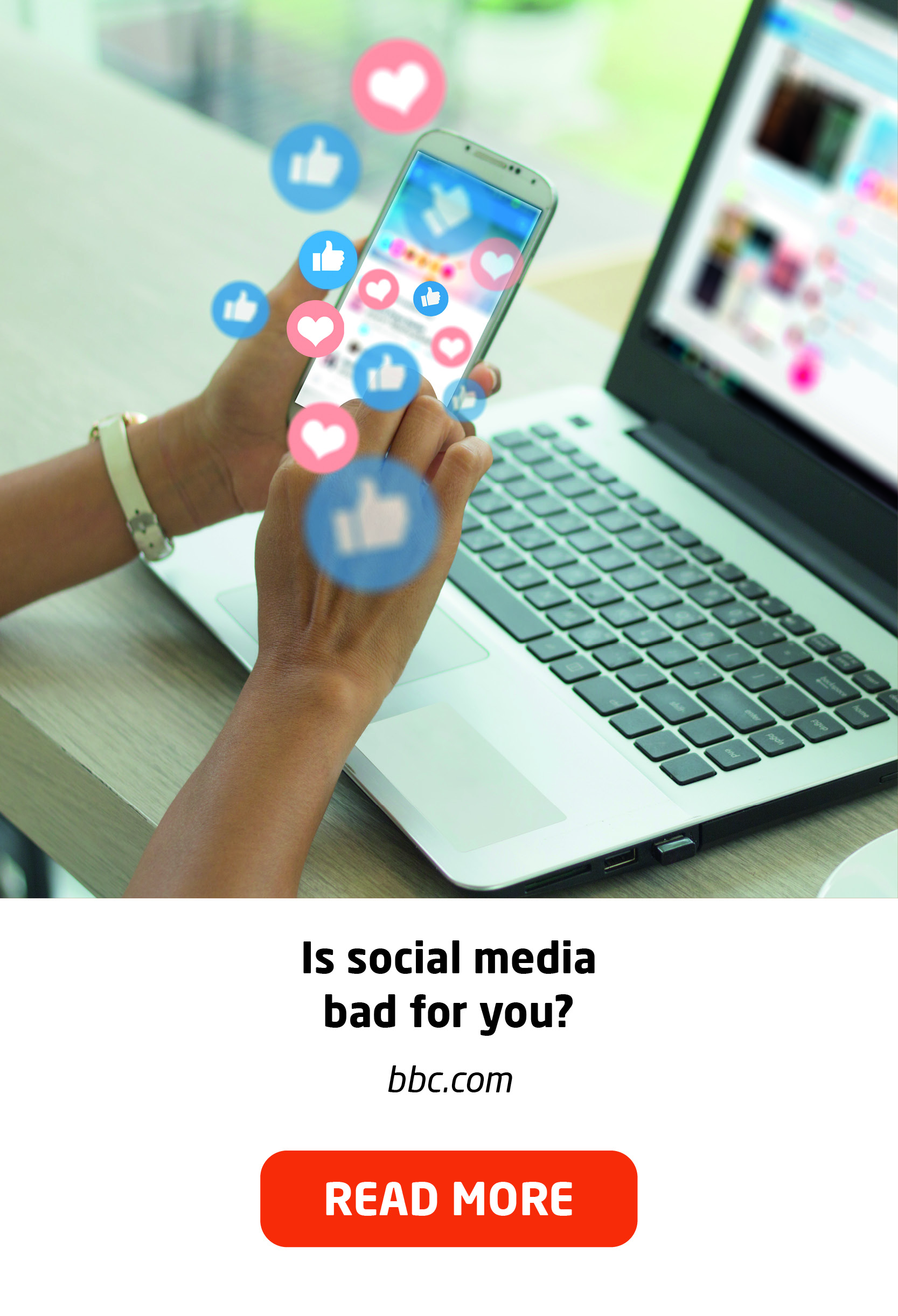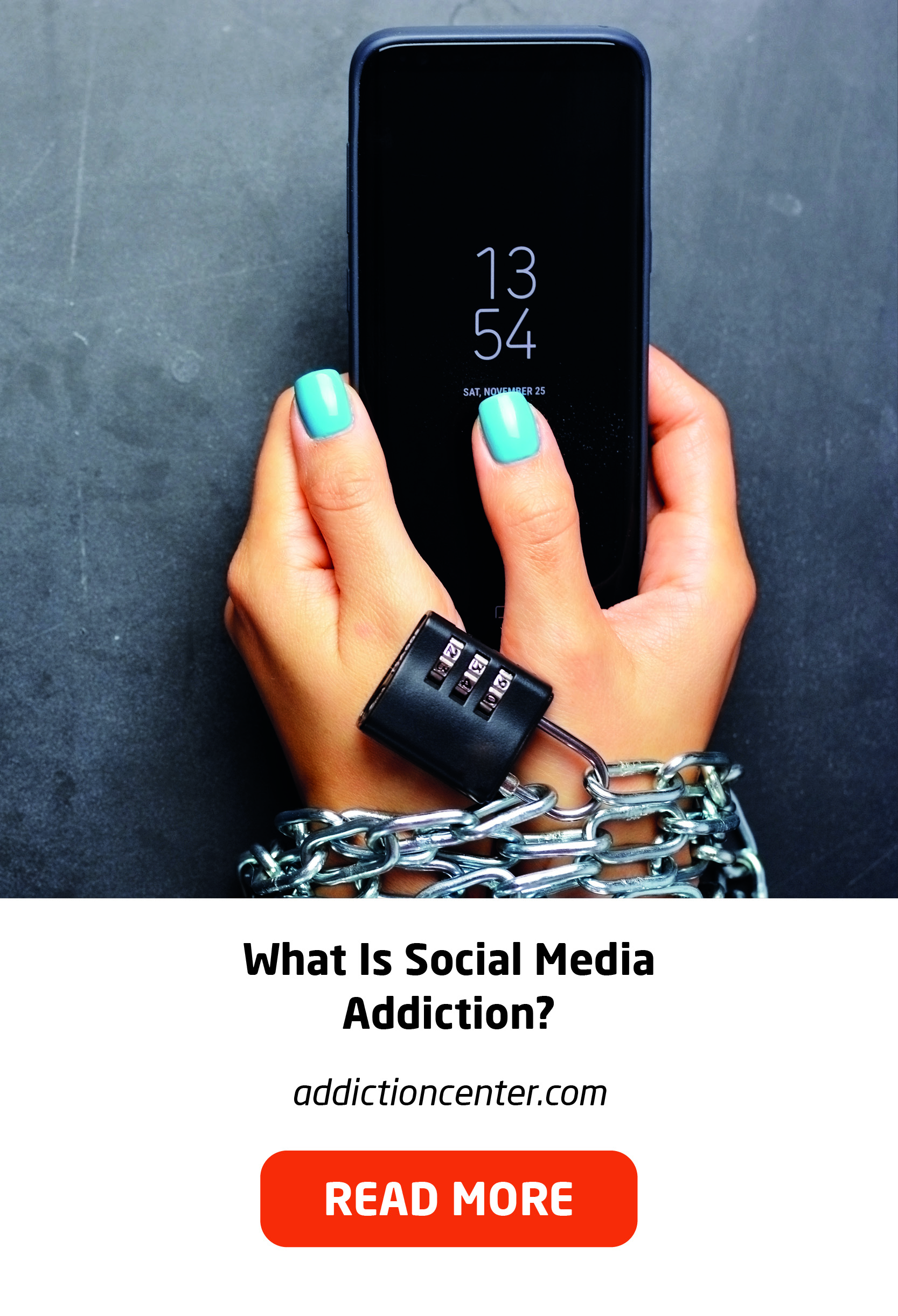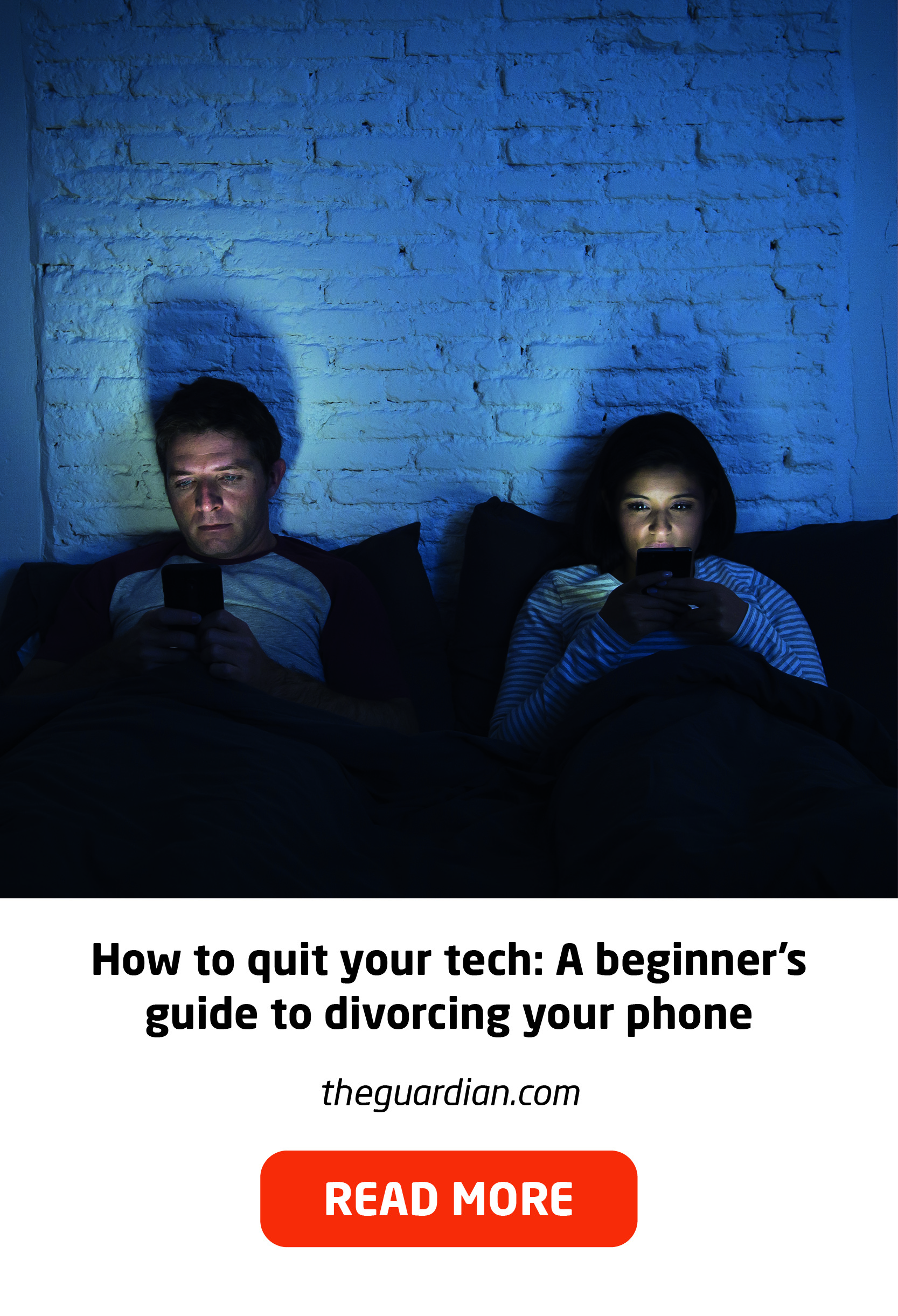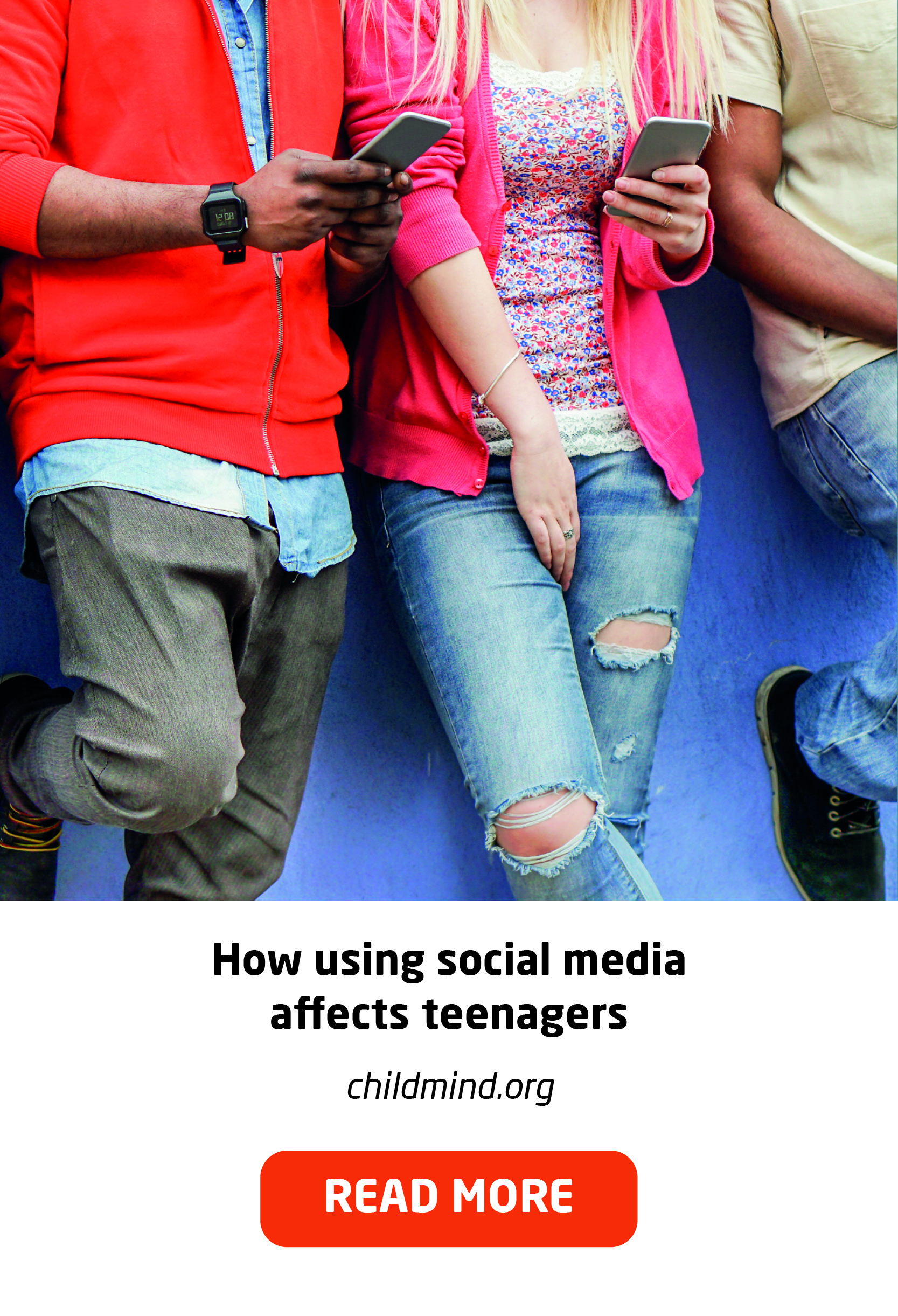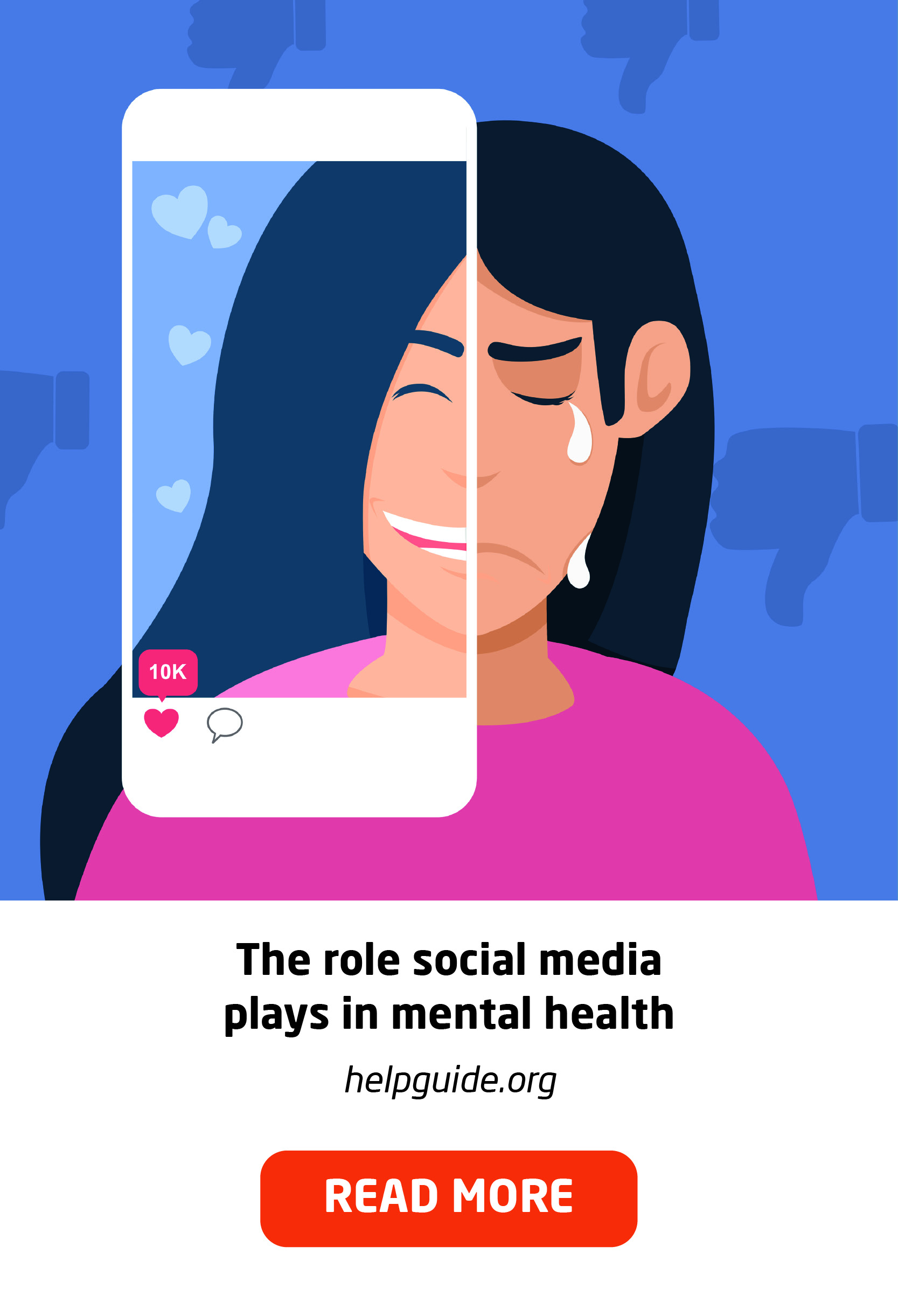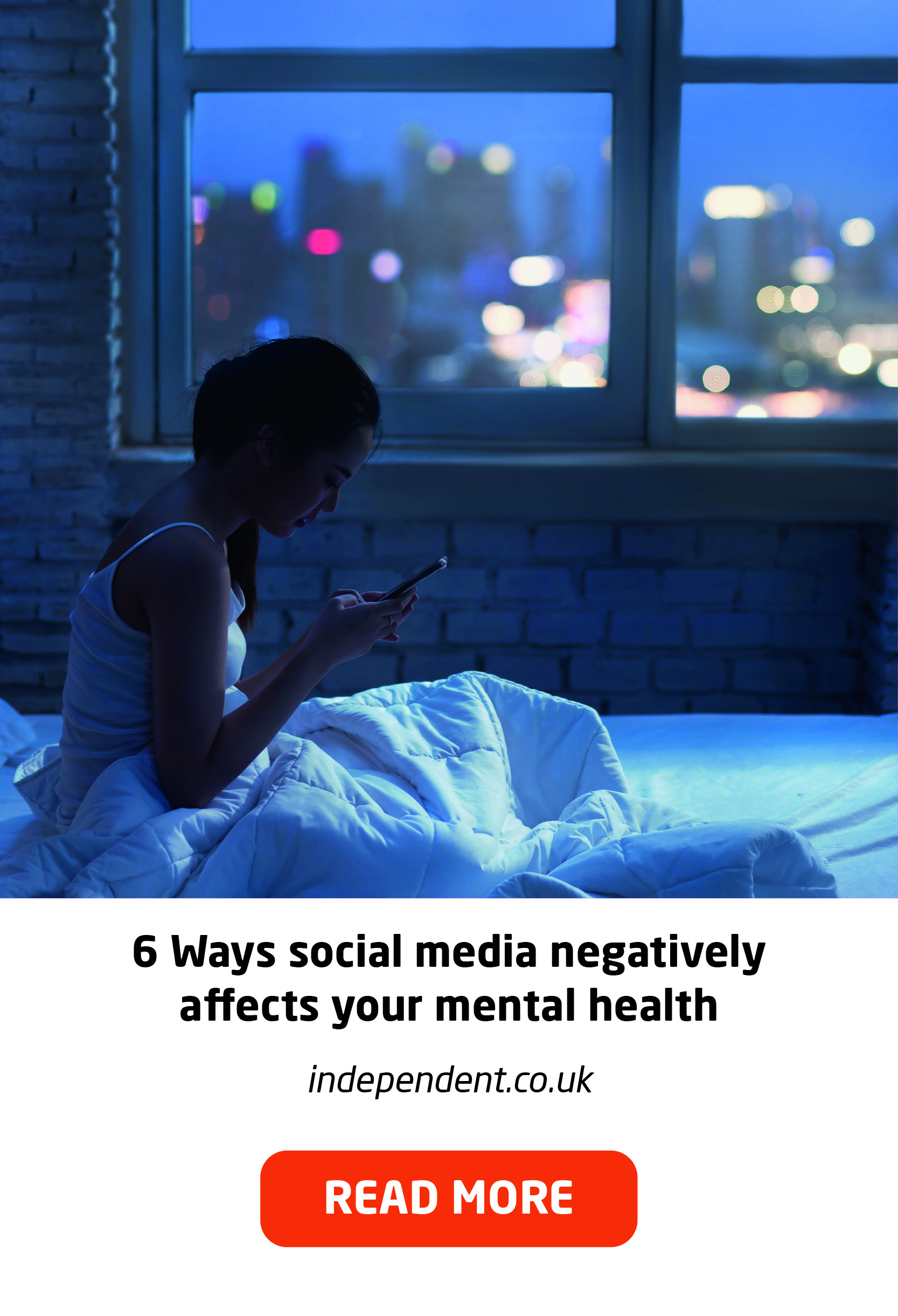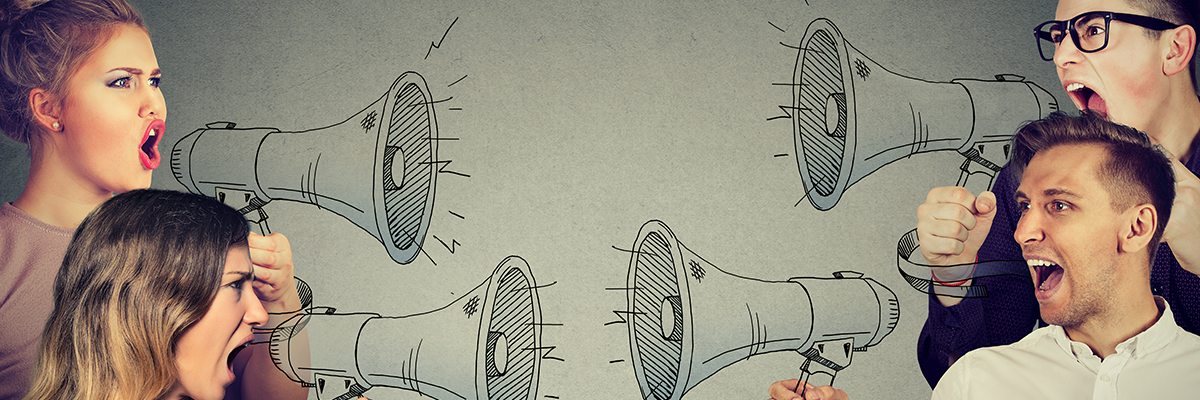
Over the last decade social presence has increased exponentially with billions of us owning Facebook, Twitter, Instagram and LinkedIn accounts. It’s important to understand the profound effect this filtered reality has on our mental health. This month we explore the impact social media has on mental health and how we can avoid its detrimental effects.
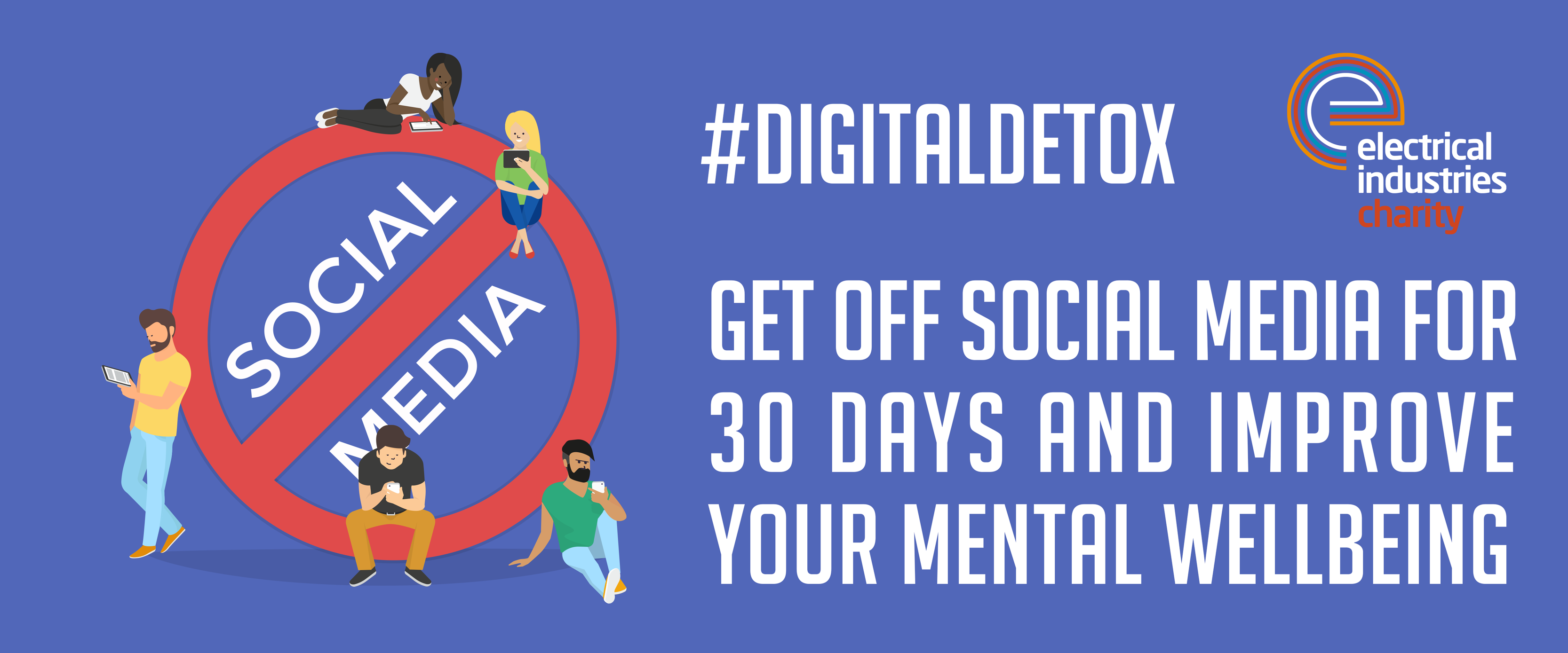
Health Challenge: No Social Media for March
Go off social media for 30 days and improve your mental wellbeing:
Why?
Most of us spend more time in front of our screens than we should or would want to. See how much extra time you can gain in a day by staying off scrolling through Facebook news feed or reading newest Instagram stories. This kind of digital detox can have positive impact on your mental wellbeing.
How?
• Stay off social media for 30 days this month. (You can choose to do less days)
• If you think your willpower is not strong enough, you can download an app on your phone that blocks certain apps you don’t want to use.
Here are some options:
Android Phones: Stay Focused
iPhone: Freedom
Post the above image and text below on your social media channels and tag @electricalcharity #DigitalDetox
I am taking part in No Social Media Challenge with EIC this month! Why don’t you join me? For every day spent off social media,
donate £1 to EIC: https://bit.ly/3gSZ0dZ @electricalcharity #DigitalDetox
• For every day spent off social media, donate £1 to EIC so we can continue supporting our industry colleagues: https://bit.ly/3pHkGxJ

We have all heard of Facebook, LinkedIn, Twitter and Instagram. We may not have an account with each of these platforms, but the likelihood is we may have one account in the social media sphere. Looking at the statistics, in total 3.5 billion people worldwide use social media in some capacity. Users spend on average 3 hours per day on social media and messaging, a huge portion of time. Facebook is the most populated social platform and more than 500 million daily active Instagram stories are uploaded worldwide. It is clear social media is a massive part of our lives even across the generations. 90.4% of Millennials, 77.5% of Generation X, and 48.2% of Baby Boomers are active social media users.
Social media is designed to bring people closer together. In today’s world where being distant has become a requirement social media can help to bring comfort, engagement and trigger feelings of happiness plus boost our sense of self-worth. For the most part social media is a positive experience for users. It allows us to connect with family, friends, old colleagues and our favourite public figures but excessive use of social media can have an impact on our wellbeing. Ironically for a technology that’s designed to bring people closer together, spending too much time engaging with social media can actually make you feel lonelier and more isolated—and exacerbate mental health problems such as anxiety and depression.

For the most part social media is a positive tool for a lot of its users. It brings you closer to the world around you, it may make you smile or teach you a new trick. It may help you feel like you belong. Social media helps to bridge the gap between you and the rest of the world. If there is a group of people who really enjoy your niche hobby it will be on social media.
In short, social media is good because you can:
- Communicate and stay up to date with family and friends around the world.
- Find new friends and communities; network with other people who share similar interests or ambitions.
- Join or promote worthwhile causes; raise awareness on important issues.
- Seek or offer emotional support during tough times.
- Find vital social connection if you live in a remote area, for example, or have limited independence, social anxiety, or are part of a marginalized group.
- Find an outlet for your creativity and self-expression.
- Discover (with care) sources of valuable information and learning.
While social media can be a positive thing 1 in 3 adults have reported they feel addicted or overwhelmed by social media and 35% of UK adults have made the conscious effort to reduce their social media use.


These days, most of us access social media via our smartphones or tablets. While this makes it very convenient to keep in touch, it also means that social media is always accessible. This round-the-clock, hyper connectivity can trigger impulse control problems, the constant alerts and notifications affecting your concentration and focus, disturbing your sleep, and making you a slave to your phone. Social media platforms are designed to snare your attention, keep you online, and have you repeatedly checking your screen for updates. It’s how the companies make money. But, much like a gambling compulsion or an addiction to nicotine, alcohol, or drugs, social media use can create psychological cravings. When you receive a like, a share, or a favourable reaction to a post, it can trigger the release of dopamine in the brain, the same “reward” chemical that follows winning on a slot machine, taking a bite of chocolate, or lighting up a cigarette, for example. The more you’re rewarded, the more time you want to spend on social media, even if it becomes detrimental to other aspects of your life.
Social media addiction is a behavioural addiction that is characterized as being overly concerned about social media, driven by an uncontrollable urge to log on to or use social media, and devoting so much time and effort to social media that it impairs other important life areas.


- You spend a lot of time when you’re offline thinking about getting back on social media
- You feel urges to use social media more and more over time
- You use social media as a distraction from personal problems
- You’ve regretted posting certain messages on social media
- You’ve tried to cut back on social media without success
- You feel bad about how much time you are spending pouring over nonsense
- Your use of social media negatively affects your job, relationship or studies?
- It’s the first thing you do in the morning and the last thing at night
If you answered “yes” to a more than three of these questions, then you may have or be developing a social media addiction.
As a precaution, that person should engage in a digital detox; a period of time during which someone significantly reduces the time spent or abstains from using electronic devices such a smartphones or computers. This can include simple steps, such as turning off sound notifications and only checking social media sites once an hour. Other changes can include having periods in the day where there is self-imposed non-screen time, such as during mealtimes, or leaving the phone in a separate room at night so as not to disturb sleep. This allows for a restored focus on social interaction in the physical world and reduces dependency on networking sites.


We have all heard of Facebook, LinkedIn, Twitter, and Instagram we may not have an account with each of these platforms, but the likelihood is we have an account within the social media sphere. 3.5 billion people worldwide use social media. Users spend on average 3 hours per day on social media and within the UK 45 million of us are active social media users. While social media can be a great tool to keep in touch, express ourselves, find communities and form connections spending too much time on social media can be detrimental to our mental health. 1 in 3 adults within the UK have reported they feel overwhelmed by social media, and 35% are actively trying to reduce their social media usage. Globally, 90.4% of millennials are active social media users and Marie, a 24-year-old employee of the generation and renewables industry, contacted the Electrical Industries Charity after her social media use began to affect her mental wellbeing.
Since her early teenage years Marie had always had a social media presence. Like many other millennials Marie had previously accessed a MySpace account on a family desktop but as technology advanced and new platforms emerged Marie owned an Instagram, Twitter, Facebook and Snapchat account all within her pocket. Being connected to friends, family and well-known faces is important to a lot of us and in limited doses social media can be a great environment but Marie was beginning to use social media excessively. While furloughed Marie found she had more time on her hands and to fill her days she began to use social media constantly. Marie was not necessarily engaging with people but scrolling all platforms on an hourly basis.
Marie was spending hours a day on social media platforms and on some days she was spending more than 6 hours on networking platforms alone. Her social media usage was becoming problematic and it was a distraction in her personal life. Marie found she could not sit down for dinner with friends or family without checking social media and she often felt as if her phone was burning a hole in her pocket. Checking her phone became a compulsive behaviour and Marie was interacting with her phone more than 20 times an hour. When Marie returned to work after 13 weeks furloughed, she found she was feeling increasingly anxious when she could not check her phone. If Marie were on long work calls or had to do a site visit where she could not interact with her device and social media platforms, she was fidgety, distracted, and anxious. Recognising her phone usage was becoming an issue Marie contacted the Electrical Industries Charity for support.
The Electrical Industries Charity can act as a listening ear for anyone within our industry who may need an outside perspective or guidance for any wellbeing issue. If the charity welfare team feel you need additional support, they may refer you for therapy or to another charity who can help. Marie spoke with the charity welfare team about her problematic phone usage and initially the charity encouraged Marie to install an app which monitored her social media use. Marie installed ‘Moment’ which gives users the opportunity to set usage limits on apps and more generally their phone. Marie placed alerts on all her social media apps meaning she would have to actively decide if she wanted to proceed to the app. Marie also turned off notifications for all social media and chose to interact with friends or family with phone calls or text. Marie found after monitoring her usage and making an active decision on whether she wants to use her phone her daily phone usage has halved almost instantly.
The Electrical Industries Charity welfare team also encouraged Marie to set downtime, periods where she was away from her phone but was still reachable. Marie would leave her phone in another room and should a text or call come in she can respond freely but it meant Marie had to actively decide if she wanted to use her device rather than mindlessly scroll.
Since regaining control of her device usage and implementing steps to stop social media interfering with her daily life Marie is feeling less anxious. Marie is enjoying phone free evenings and has found her digital detox has prompted friends and family to favour in person connections and interactions rather than digital ones.
The Electrical Industries Charity can help to guide you in the right direction and can provide simple support strategies which make an active difference to your daily life. The charity welfare team are equipped in safeguarding mental wellbeing and here to support our industry. If you would like support, then please contact This email address is being protected from spambots. You need JavaScript enabled to view it. or 0800 652 1618.

There are a whole list of reasons as to why we may be addicted to social media. Here are three of the big reasons as to why we just can’t put down our phones:
A fear of missing out (FOMO) can keep you returning to social media over and over again. Even though there are very few things that can’t wait or need an immediate response, FOMO will have you believing otherwise. Perhaps you’re worried that you’ll be left out of the conversation at school or work if you miss the latest news or gossip on social media? Or maybe you feel that your relationships will suffer if you don’t immediately like, share, or respond to other people’s posts? Or you could be worried you’ll miss out on an invitation or that other people are having a better time than you.
Many of us use social media as a “security blanket”. Whenever we’re in a social situation and feel anxious, awkward, or lonely, we turn to our phones and log on to social media. Of course, interacting with social media only denies you the face-to-face interaction that can help to ease anxiety.
Your heavy social media use could be masking other underlying problems, such as stress, depression, or boredom. If you spend more time on social media when you’re feeling down, lonely, or bored, you may be using it to distract yourself from unpleasant feelings or self-soothe your moods. While it can be difficult at first, allowing yourself to feel can open you up to finding healthier ways to manage your moods.


Research has shown that there is an undeniable link between social media use, negative mental health, and low self-esteem. While social media platforms have their benefits, using them too frequently can make people feel increasingly unhappy and isolated. These negative emotional reactions are not only produced due to the social pressure of sharing things with others, but also the comparison of material things and lifestyles that these sites promote.

The ‘Love Island’ effect is coined as such because of the effect reality TV has had on social media, our consumption of social media and how we allow social media to impact us.
‘Love Island’ is a huge TV show, the final in 2019 was watched by 3.56 million people and for the winners of the TV show they become social media influencers overnight. An influencer being someone who garners a large social media presence and following and uses this to advertise products, lifestyles and ultimately themselves. Today, influencer marketing is one of the top ways companies sell products especially to millennials and Generation Z.
‘Love Island’ and other reality shows such as ‘The Only Way is Essex’, ‘Keeping up with the Kardashians’ and ‘Made in Chelsea’ have helped to create a social media lifestyle coveted by much of the wider public. Think flash cars, a never-ending wardrobe, designers’ dogs, lavish holidays and even more lavish occasion celebrations. With their extraordinary lifestyles splashed over social media, almost all of which will gifted, paid for or promotional, many members of the public aspire to have what they have. These influencers become the benchmark of success in terms of assets, looks, wealth and mindset. Essentially, many of those who view their social media posts want to emulate them and this filtered reality they present and this has many unwanted effects.
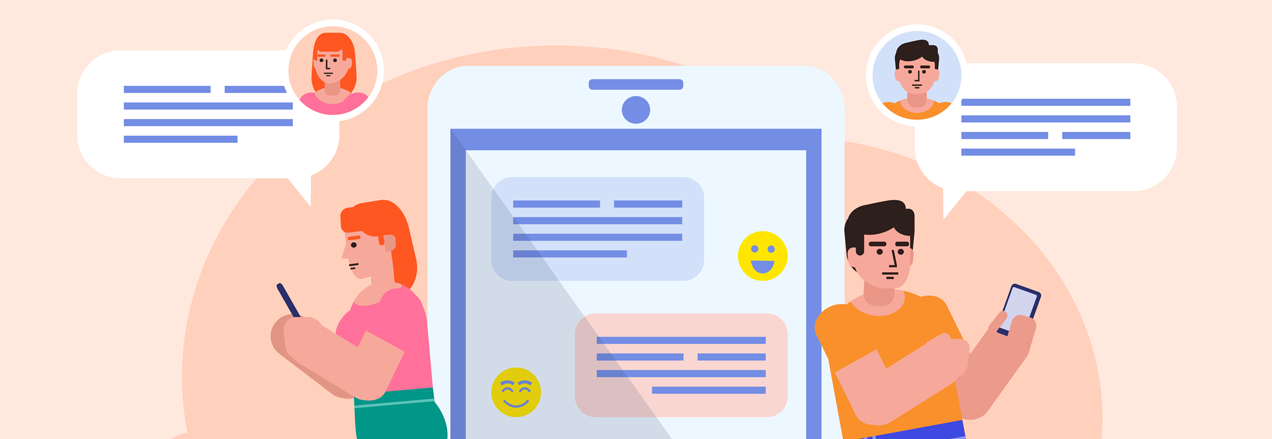

The effect too much social media consumption has on our mental wellbeing is profound. With the rise of reality television many of us are subject to the ‘Love Island’ effect. This effect is coined as such because of the effect reality TV has had on social media, our consumption of social media and how we allow social media to impact us. Reality shows such as ‘Love Island’ have helped to create a social media lifestyle coveted by much of the wider public.
Coveting a lifestyle which for many is unattainable is extremely unhealthy for our mental and physical wellbeing. The ‘National IPED Drug Survey ‘, authored by The Public Health Institute found that just over 56% of participants were said to be using steroids for “aesthetic reasons” followed closely by 45% who used for “non-competitive bodybuilding.” Mental Health Foundation released startling figures which identified that 1 in 5 UK adults had felt shame because of their body image within the last year. Research indicates that scrolling through hundreds of social media images increases body dissatisfaction and watching hours of image-focused reality TV may do the same. James, who works for an electrical wholesaler within their warehouse began to become obsessive about fitness and his body image during lockdown.
James has worked within the electrical sector for nine years and although has a great support network was spending a lot of time alone during the first lockdown period. James wanted to do something productive and proactive in his time and focused on becoming fitter. While exercise is a great way to keep healthy, reduce stress and promote happiness James had begun to develop an unhealthy obsession with exercise and diet. He spent hours scrolling Instagram and watching YouTube videos on fitness. James coveted the physiques of those on social media and to try and attain this physique James began to exercise twice daily, and he became obsessive over calorie counting. Once returning to full time work his obsession continued and James’ colleagues noticed his restrictive diet, obsessive nature and he had begun to withdraw from his colleagues as well as friends and family. If James didn’t exercise or exceeded his set calorie limits, he became anxious and would often sacrifice sleep or connecting with friends or family to exercise.
James’ colleague who had recently attended the Electrical Industries Charity Mental Health First Aider Training course approached James and he confided in them about his anxiety and obsessive behaviours. His colleague referred James to the Electrical Industries Charity who spoke with James about his body image issues. After garnering details of what James was experiencing his Charity caseworker referred him for Cognitive Behavioural Therapy (CBT). CBT is a talking therapy which focuses on reframing negative thoughts and feelings that impact behaviour. CBT also provides practical strategies to improve wellbeing. The Electrical Industries Charity also referred James to a nutritionist who helped him to build a fitness and exercise plan which would meet his goals sustainably and without disruption this his daily life.
James has now developed a far healthier relationship with food and exercise and is now exercising with overall health in mind rather than just physique. James has reduced his social media consumption and regularly fact checks himself when consuming social media. James is equipped with techniques to cope and reduce his negative feelings and is working on reframing negative thoughts before they effect his wellbeing.
The Electrical Industries Charity can help support you if you’re struggling with addiction, obsessive behaviours or anxiety. Please contact the welfare team on 0800 652 1618 or This email address is being protected from spambots. You need JavaScript enabled to view it.

Coveting a lifestyle which for many is completely unattainable (including for a lot of these influencers) is extremely unhealthy for our mental and physical wellbeing. The ‘National IPED Drug Survey‘, authored by The Public Health Institute found that just over 56% of participants were said to be using steroids for “aesthetic reasons” followed closely by 45% who used for “non-competitive bodybuilding.” Mental Health Foundation released startling figures which identified that 1 in 5 UK adults had felt shame because of their body image within the last year. Part of their ‘Body Image Report’ these figures increased to 37% feeling “upset” and 31% “ashamed” when looking at teenagers. Research indicates that scrolling through hundreds of social media body images increases body dissatisfaction and watching hours of image-focused reality TV may do the same.
A 2010 Spanish study found that males and females with disordered eating had consumed more body image-focused media (TV and magazines). Idolising these fake realities and filtered lifestyles can have a massive impact of self-esteem and self-worth. It can encourage constant comparison between your reality and a reality which isn’t even real! Consuming this filtered reality social media can also have a massive impact on our financial wellbeing.
In fact, over half of millennials say that they've made impulsive purchases based on the content they saw on their social media feeds. And 82 percent of social media users say they share their latest purchases with their friends.
Ultimately, social media can drive spending and reduce savings due to a culture of consumption and comparison. It’s not just influencers and the brands they promote which are responsible for this. Whether you're liking Bali pictures on Instagram or reading about your friend's latest purchases on Facebook, social media often creates an illusion that others may be better off, creating unrealistic comparisons. Seeing a friend or co-worker’s posts about weekly brunches or European vacations isn't harmless. Instead, it can spark jealousy and wanderlust, pushing us to spend more and save less. After all, our financial decisions are heavily influenced by our peers and what we consider "normal." Social media often creates the notion that constant spending is both desirable and normal.
Social media platforms use targeted ads — based on demographics like your age, gender, and location — to market products directly to you. Every time you swipe and scroll, you're giving the platform crucial information that will help them determine what they should advertise to you. And because we're spending so many more hours on social media platforms than ever before, they can even alter the way we think about ourselves. To want more, you first have to think you don't have enough, or even that you aren't good enough yourself. Marketing strategies often rely on building up insecurities, implanting self-doubts, and creating problems — problems that, many ads claim, only their products can solve. But fear-based purchases won't make you happy; they'll only lead to more fear, as you'll start to want "more, more, more." This mindset can affect your savings, as you could become more focused on displaying visible signs of wealth rather than building your financial stability behind closed doors. Your savings account is far more important than showing off what you do or don't have.
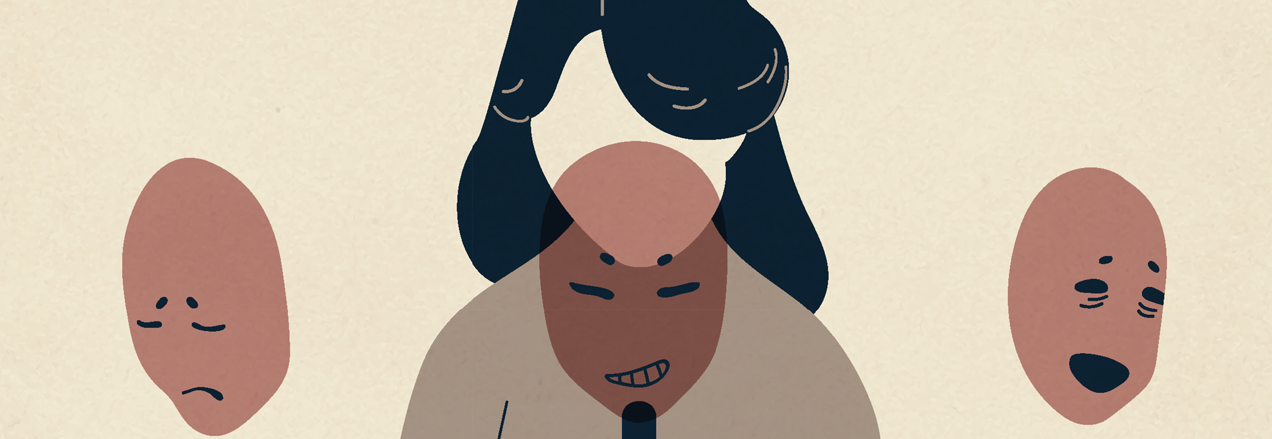

Everyone is different and there is no specific amount of time spent on social media, or the frequency you check for updates, or the number of posts you make that indicates your use is becoming unhealthy. Rather, it has to do with the impact time spent on social media has on your mood and other aspects of your life, along with your motivations for using it. Recent studies have found that frequent social network users believe that other users are happier and more successful than they are, especially when they do not know them very well in real life.
Excessive social media use can not only cause unhappiness and a general dissatisfaction with life in users, but also increase the risk of developing mental health issues such as anxiety and depression. Constantly comparing oneself to others can lead to feelings of self-consciousness or a need for perfectionism and order, which often manifests itself into social anxiety disorder. In a 2017 study conducted by Harvard University, researchers found that social media has a significant detrimental effect on the emotional well-being of chronic users and their lives, negatively impacting their real-life relationships and academic achievement among those still in an educational setting.
An estimated 27% of children who spend 3 or more hours a day on social media exhibit symptoms of poor mental health. 41% stated that social media platforms make them feel anxious, sad or depressed. A study performed by California State University found that individuals that visited any social media site at least 58 times per week were 3 times more likely to feel socially isolated and depressed compared to those who used social media fewer than 9 times per week.
Those who had spent more time on social media had 2.2 times the risk of reporting eating and body image concerns, compared to their peers who spent less time on social media. Everything from physical appearance to life circumstances to perceived successes are scrutinized and processed by users. The need to gain likes on social media can cause teens to not only alter their appearance, but make choices they would otherwise not make, including accepting risky social media challenges and engaging in negative behaviours. Your social media use may be problematic if it causes you to neglect face-to-face relationships, distracts you from work or school, or leaves you feeling envious, angry, or depressed. Similarly, if you’re motivated to use social media just because you’re bored or lonely or want to post something to make others jealous or upset, it may be time to reassess your social media habits.
Indicators that social media may be adversely affecting your mental health include:
- Spending more time on social media than with real world friends - Using social media has become a substitute for a lot of your offline social interaction. Even if you’re out with friends, you still feel the need to constantly check social media, often driven by feelings that others may be having more fun than you.
- Comparing yourself unfavourably with others on social media - You have low self-esteem or negative body image. You may even have patterns of disordered eating.
- Experiencing cyberbullying - Or you worry that you have no control over the things people post about you.
- Being distracted at school or work - You feel pressure to post regular content about yourself, get comments or likes on your posts, or respond quickly and enthusiastically to friends’ posts.
- Having no time for self-reflection - Every spare moment is filled by engaging with social media, leaving you little or no time for reflecting on who you are, what you think, or why you act the way that you do—the things that allow you to grow as a person.
- Engaging in risky behaviour in order to gain likes, shares, or positive reactions on social media - You play dangerous pranks, post embarrassing material, cyberbully others, or access your phone while driving or in other unsafe situations.
- Suffering from sleep problems - Do you check social media last thing at night, first thing in the morning, or even when you wake up in the night? The light from phones and other devices can disrupt your sleep, which in turn can have a serious impact on your mental health.
- Worsening symptoms of anxiety or depression - Rather than helping to alleviate negative feelings and boost your mood, you feel more anxious, depressed, or lonely after using social media.
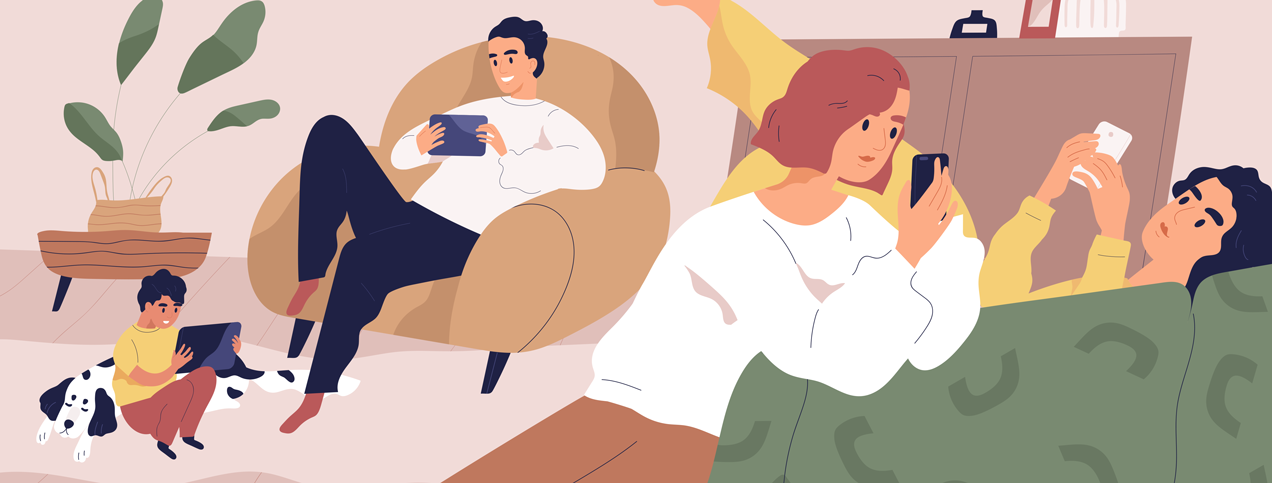

If you feel you are spending too much time on social media platforms and it is negatively impacting your wellbeing in any capacity whether that be not getting enough sleep, compromising your sense of self-worth or causing you to impulse buy then there are some things you can do to take the power away from social media.

1) Reduce your time online
A 2018 University of Pennsylvania study found that reducing social media use to 30 minutes a day resulted in a significant reduction in levels of anxiety, depression, loneliness, sleep problems, and FOMO
The following tips can help:
- Use an app to track how much time you spend on social media each day. Then set a goal for how much you want to reduce it by.
- Turn off your phone at certain times of the day, such as when you’re driving, in a meeting, at the gym, having dinner, spending time with offline friends, or playing with your kids. Don’t take your phone with you to the bathroom.
- Don’t bring your phone or tablet to bed. Turn devices off and leave them in another room overnight to charge.
- Disable social media notifications. It’s hard to resist the constant buzzing, beeping, and dinging of your phone alerting you to new messages. Turning off notifications can help you regain control of your time and focus.
- Limit checks. If you compulsively check your phone every few minutes, wean yourself off by limiting your checks to once every 15 minutes. Then once every 30 minutes, then once an hour. There are apps that can automatically limit when you’re able to access your phone.
- Try removing social media apps from your phone so you can only check Facebook, Twitter and the like from your tablet or computer. If this sounds like too drastic a step, try removing one social media app at a time to see how much you really miss it.

2) Change your focus
Many of us access social media purely out of habit or to mindlessly kill moments of downtime. But by focusing on your motivation for logging on, you can not only reduce the time you spend on social media, you can also improve your experience and avoid many of the negative aspects. Next time you go to access social media, pause for a moment and clarify your motivation for doing so.
- Are you using social media as a substitute for real life? Is there a healthier substitute for your social media use? If you’re lonely, for example, invite a friend out for coffee instead. Feeling depressed? Take a walk or go to the gym. Bored? Take up a new hobby. Social media may be quick and convenient, but there are often healthier, more effective ways to satisfy a craving.
- Are you an active or a passive user on social media? Passively scrolling through posts or anonymously following the interaction of others on social media doesn’t provide any meaningful sense of connection. It may even increase feelings of isolation. Being an active participant, though, will offer you more engagement with others.
- Does social media leave you feeling inadequate or disappointed about your life? You can counter symptoms of FOMO by focusing on what you have, rather than what you lack. Make a list of all the positive aspects of your life and read it back when you feel you’re missing out on something better. And remember no one’s life is ever as perfect as it seems on social media. We all deal with heartache, self-doubt, and disappointment, even if we choose not to share it online.
3) Spend more time with offline friends
We all need the face-to-face company of others to be happy and healthy. At its best, social media is a great tool for facilitating real-life connections.
- Set aside time each week to interact offline with friends and family. Try to make it a regular get-together where you always keep your phones off.
- If you’ve neglected face-to-face friendships, reach out to an old friend (or an online friend) and arrange to meet up. If you both lead busy lives, offer to run errands or exercise together.
- Join a club. Find a hobby, creative endeavor, or fitness activity you enjoy and join a group of like-minded individuals that meet on a regular basis.
- Don’t let social awkwardness stand in the way. Even if you’re shy, there are proven techniques to overcome insecurity and build friendships.
- If you don’t feel that you have anyone to spend time with, reach out to acquaintances. Lots of other people feel just as uncomfortable about making new friends as you do—so be the one to break the ice. Invite a co-worker out for lunch or ask a neighbour or classmate to join you for coffee.
- Interact with strangers. Look up from your screen and connect with people you cross paths with on public transport, at the coffee shop, or in the grocery store. Simply smiling or saying hello will improve how you feel—and you never know where it may lead.
4) Express Gratitude
Feeling and expressing gratitude about the important things in your life can be a welcome relief to the resentment, animosity, and discontent sometimes generated by social media.
- Take time for reflection. Try keeping a gratitude journal or using a gratitude app. Keep track of all the great memories and positives in your life—as well as those things and people you’d miss if they were suddenly absent from your life. If you’re more prone to venting or negative posts, you can even express your gratitude on social media—although you may benefit more from private reflection that isn’t subject to the scrutiny of others.
- Practice mindfulness. Experiencing FOMO and comparing yourself unfavourably to others keeps you dwelling on life’s disappointments and frustrations. Instead of being fully engaged in the present, you’re focused on the “what ifs” and the “if only” that prevent you from having a life that matches those you see on social media. By practicing mindfulness, you can learn to live more in the present moment, lessen the impact of FOMO, and improve your overall mental wellbeing.
- Volunteer. Just as human beings are hard-wired to seek social connection, we’re also hard-wired to give to others. Helping other people or animals not only enriches your community and benefits a cause that’s important to you, but it also makes you feel happier and more grateful.

You may feel as though you are spending too much time on social media platforms and you are not alone in wanting to cut down your exposure to these platforms. 35% of UK adults have made a conscious effort to cut back their social media use in the last year, with those in the millennial age bracket (anyone born between 1981-1996; aged 23-38 in 2019) showing the biggest reduction in usage — over half said their social media usage had decreased in the last 12 months!
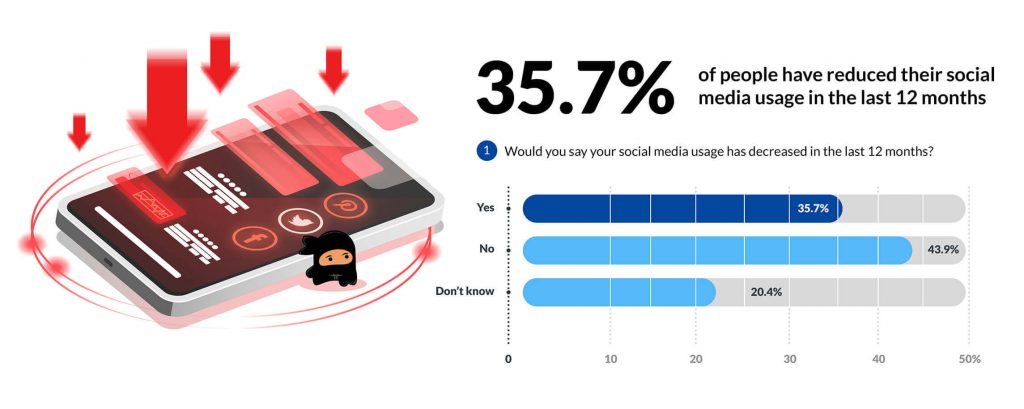
29% deleted social media due to feeling overloaded while 21% deleted due to mental health and wellbeing concerns.
More and more of us are choosing to delete social media platforms or reduce our time on then as we understand more the effects that screen time and excessive social media use can have on us.
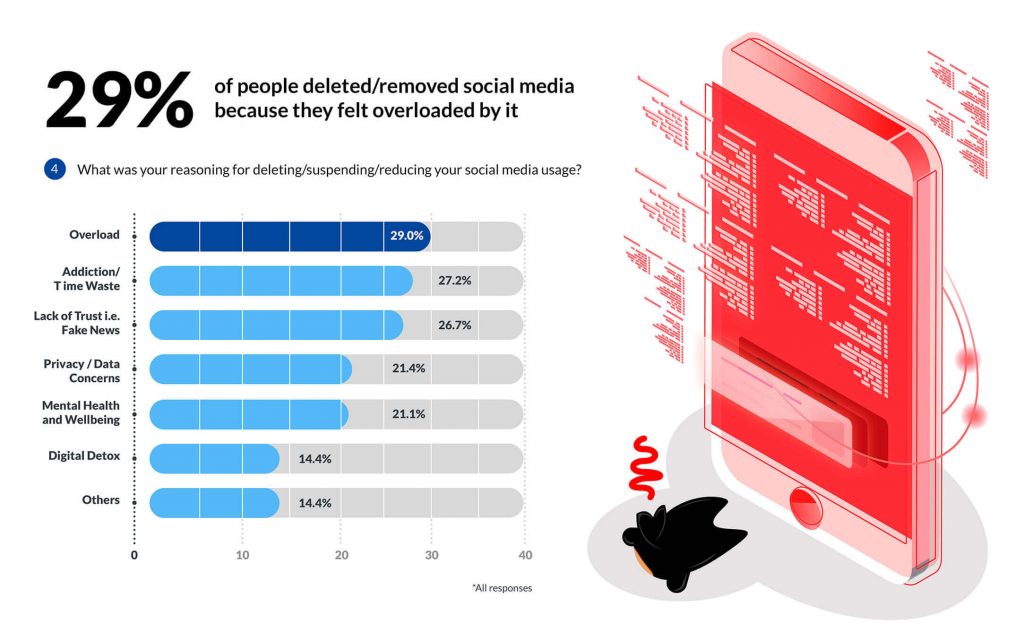

Childhood and the teenage years can be filled with developmental challenges and social pressures. For some kids, social media has a way of exacerbating those problems and fuelling anxiety, bullying, depression, and issues with self-esteem. If you’re worried about your child’s social media use, it can be tempting to simply confiscate their phone or other device. But that can create further problems, separating your child from their friends and the positive aspects of social media. Instead, there are other ways to help your child use Facebook, Instagram, and other platforms in a more responsible way.
- Monitor and limit your child’s social media use. The more you know about how your child is interacting on social media, the better you’ll be able to address any problems. Parental control apps can help limit your child’s data usage or restrict their phone use to certain times of the day. You can also adjust privacy settings on the different platforms to limit their potential exposure to bullies or predators.
- Talk to your child about underlying issues. Problems with social media use can often mask deeper issues. Is your child having problems fitting in at school? Are they suffering from shyness or social anxiety? Are problems at home causing them stress?
- Enforce “social media” breaks. For example, you could ban social media until your child has completed their homework in the evening, not allow phones at the dinner table or in their bedroom, and plan family activities that preclude the use of phones or other devices. To prevent sleep problems, always insist phones are turned off at least one hour before bed.
- Teach your child how social media is not an accurate reflection of people’s lives. They shouldn’t compare themselves or their lives negatively to others on social media. People only post what they want others to see. Images are manipulated or carefully posed and selected. And having fewer friends on social media doesn’t make your child less popular or less worthy.
- Encourage exercise and offline interests. Get your child away from social media by encouraging them to pursue physical activities and hobbies that involve real-world interaction. Exercise is great for relieving anxiety and stress, boosting self-esteem, and improving mood—and is something you can do as a family. The more engaged your child is offline, the less their mood and sense of self-worth will be dependent on how many friends, likes, or shares they have on social media.
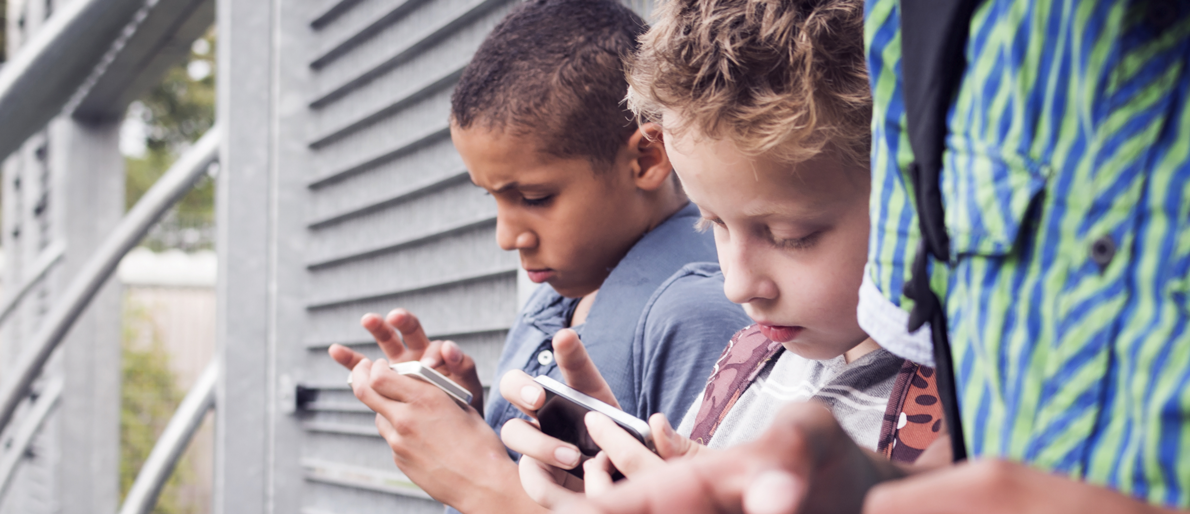

Given the spotlight on social media, the misinformation it can spread and the impact the reality it presents can have on our mental health there are lots of wider resources where you can gain more insight into the issue.
The Social Dilemma, 2020 available on Netflix
Set in the dark underbelly of Silicon Valley, The Social Dilemma fuses investigative documentary with enlightening narrative drama. Expert testimony from tech whistle-blowers exposes our disturbing predicament: the services Big Tech provides-search engines, networks, instant information, etc.-are merely the candy that lures us to bite. Once we're hooked and coming back for more, the real commodity they sell is their prowess to influence and manipulate us.
The Impact of Social Media on Mental Health, 2016 from Talkspace
https://www.youtube.com/watch?v=YxY4j3P76DQ&feature=emb_logo
Which social media trends are having a negative impact on our mental health? How can we have a healthier relationship with social media in our everyday lives? Kaja Perina, Editor in Chief of Psychology Today, leads a panel on the impact of social media on mental health at the Talkspace Future of Therapy Conference 2016.
The Great Hack, 2019 available on Netflix
Focuses on the mining of data from social media profiles and how social media can impact your decision making

References:
1. https://www.helpguide.org/articles/mental-health/social-media-and-mental-health.htm
2. https://www.healthista.com/8-signs-addicted-social-media
3. https://www.helpguide.org/articles/mental-health/social-media-and-mental-health.htm
4. https://www.tuxtra.co.uk/the-love-island-effect
5. https://www.addictioncenter.com/drugs/social-media-addiction
6. https://www.helpguide.org/articles/mental-health/social-media-and-mental-health.htm
7. https://exposureninja.com/blog/cutting-back-social-media


